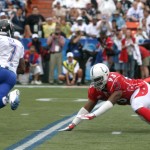 Michael Vick’s return to the NFL last Thursday demonstrated, if nothing else, that Americans are tired of debating dog-fighting and the appropriateness of Vick’s 23 month sentence for violating federal dog-fighting laws. Only a couple of anti-Vick demonstrators showed up at the game. In fact, by far the largest number of demonstrators at the game were civil rights activists, many members of the Philadelphia chapter of the NAACP and the Black Clergy of Philadelphia. The pro-Vick demonstrators were there to protest the harsh treatment that Vick received, and, in their view, continues to receive, from animal rights groups and the American legal system.
Michael Vick’s return to the NFL last Thursday demonstrated, if nothing else, that Americans are tired of debating dog-fighting and the appropriateness of Vick’s 23 month sentence for violating federal dog-fighting laws. Only a couple of anti-Vick demonstrators showed up at the game. In fact, by far the largest number of demonstrators at the game were civil rights activists, many members of the Philadelphia chapter of the NAACP and the Black Clergy of Philadelphia. The pro-Vick demonstrators were there to protest the harsh treatment that Vick received, and, in their view, continues to receive, from animal rights groups and the American legal system.
The national debate triggered by Vick’s arrest and conviction revealed that most middle and upper class Americans viewed dog-fighting as barbaric and properly criminal. On the other hand, it also made many aware for the first time that there were racial, socio-economic, and regional dimensions to the debate. While few openly called for the repeal of all dog-fighting laws, it became clear that many African-Americans and rural whites, particularly Southerners and those with lower incomes, did not view dog fighting as a particularly serious offense. Many in these groups still find it a fascinating and exhilarating spectator sport, and, consequently, view the laws against it as trivial and unfair. From their perspective the issue was not so much one of animal rights but the ability of the majority to impose their cultural views on a relatively powerless minority.
Although dog-fighting has been illegal in every state for some time now—Vick’s home state of Virginia outlawed “commercialized” dog-fighting and betting on dog-fights at the end of the 19th century—the sport once had a long and surprisingly upper class pedigree. Queen Elizabeth I was a great fan of dog-fighting and prevented Parliament from outlawing the sport during her reign. Dog-fighting, along with bear baiting, cock fighting, gander pulling, and other blood sports were quite popular in colonial Virginia and helped to unite individuals of different races and economic classes, including slaves and their masters.
Even after dog-fighting was outlawed, at least in the South there was a long tradition of law enforcement officials looking the other way, or sometimes joining in the activity. (In that regard, it was like “moonshining.”) To this day, the kindred sport of cock fighting remains legal in Virginia (so long as it is done solely for the enjoyment of the spectators and no money changes hands), and a recent effort to abolish it in the Old Dominion failed, in part because the state’s farmers are among the nation’s leading breeders of fighting roosters. More over, hunting, fishing, and horse racing continue to be perfectly legal although it is hard to believe that the animals involved derive much pleasure from the sport.
I spent a good part of the summer in my hometown of Pearisburg, Virginia (pop. 2200). While I was there, the topic of conversation frequently turned to Michael Vick. Although the town has a black town councilman which it elected in at large voting, it is predominantly white and very conservative. Almost without exception, however, everyone seemed to view seemed to feel that Vick had gotten an extremely raw deal.
While it is true that the town is overwhelming populated by fans of Virginia Tech (Vick’s alma mater), I don’t think that that was the reason for their views. (They would have felt the same, I think, even if he had played for UVa or West Virginia University.) For what they viewed as at best a minor infraction against an animal, Vick was punished as though he had committed a serious offense against another human being.
I am sure that nothing would please Michael Vick more than for the public to completely forget about his dog-fighting experiences. However, as the focus of civil rights disputes increasingly shifts from issues of race to issues of culture, Vick may be a symbol of resistance for those who embrace rural, lower class Southern values instead of those of the middle-class majority.
 Simple bank robbery carries a maximum sentence of twenty years, but armed bank robbery has an enhanced maximum of twenty-five. Should a robbery be considered armed, though, when the robber carries an unloaded weapon?
Simple bank robbery carries a maximum sentence of twenty years, but armed bank robbery has an enhanced maximum of twenty-five. Should a robbery be considered armed, though, when the robber carries an unloaded weapon? 

